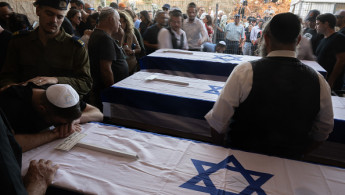Israeli commander linked to Oct 7 'friendly fire' to head Gaza division
The Israeli army has promoted a commander linked to the controversial 7 October decision to fire tank shells at homes containing Israeli captives and Hamas fighters, granting him the position of commander of the Gaza Division.
An army spokesman announced the appointment of Brigadier General Barak Hiram on Tuesday, amid outcry from families of Israelis thought to have been killed by 'friendly fire' on 7 October.
On Tuesday, Hiram met with relatives of Israelis killed in the home of Pesi Cohen on 7 October, Haaretz reported. A statement from Kibbutz Be'eri described the meeting as "complex and very charged", with the bereaved families criticising Hiram's actions on 7 October and his subsequent media appearances.
A bereaved relative, Ron Shafroni, told Haaretz that some of the families had called for Hiram to step down, with Hiram insisting that his role in Be'eri put him in the "best position" to head the Gaza Division.
Hiram was named by a New York Times investigation in December as the commander who allegedly ordered his forces to break into the home of Pesi Cohen, regardless of the risk of civilian harm.
December also saw the release of documentation by Israel's Channel 12 which showed a tank arriving at the kibbutz and firing tanks towards the home where captives were held.
An Israeli army investigation into the incident concluded that Hiram's forces "acted in coordination and professionalism in the face of a difficult and complex reality".
An estimated 1,139 people were killed in Israel during the Hamas-led 7 October attacks, and more than 200 were taken captive. A preliminary death toll by Israel placed the death toll closer to 1,400, however this was later revised.
Among other factors, it was found that some of the charred bodies recovered from the sites were those of Palestinian fighters killed by Israeli missile fire.
Israel has been accused of indiscriminately firing at both Palestinian fighters and Israelis on 7 October, with an Al Jazeera investigation aired in March concluding that at least 19 Israelis were likely killed by Israeli forces.
Earlier in July, Haaretz reported that the Israeli army employed the "Hannibal Directive" on 7 October — a military protocol where Israeli soldiers would kill captives and their captors to stop enemies from being able to use Israeli citizens as bargaining chips.
The directive dates back to the 1980s but was revised after Hamas members abducted a soldier in 2006. While it officially does not allow soldiers to kill captives intentionally, it has been used and interpreted it in this way by Israel on multiple occasions.
Haaretz obtained documents and testimonies from soldiers and mid-level and senior army officials revealing orders and procedures by the army's Gaza Division, showing the procedure was widespread "from the first hours following the [7 October] attack and at various points along the border".
A "very senior" army source confirmed to the news outlet that the procedure was used on 7 October. The division was given the order by Israeli command that "not a single vehicle can return to Gaza", which the army understood as a green light to implement the directive.





 Follow the Middle East's top stories in English at The New Arab on Google News
Follow the Middle East's top stories in English at The New Arab on Google News


